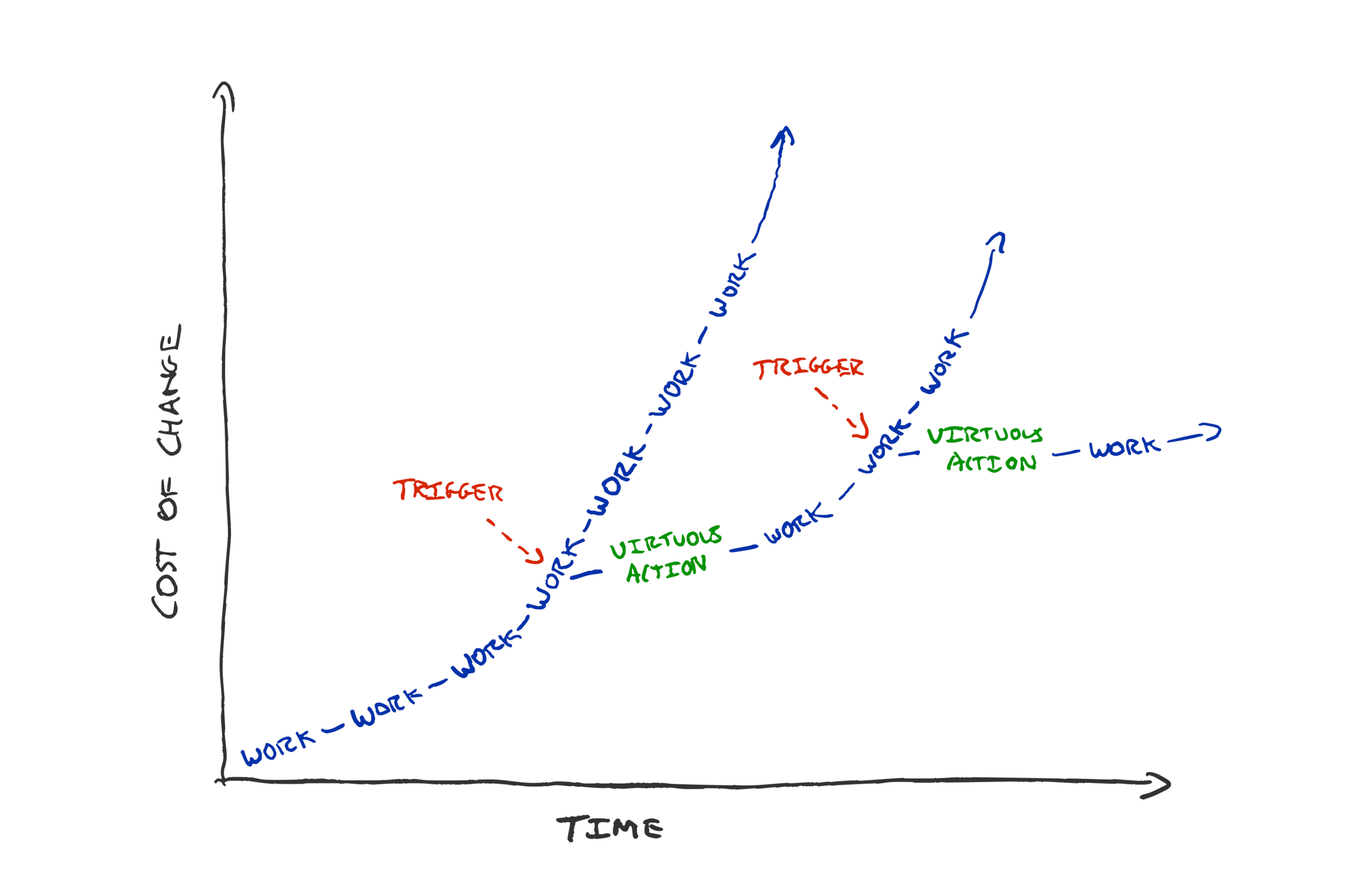If you’re struggling with how to get to tidy code, fast feedback loops, joyful work. How to get permission, or buy-in. Try team habits.
Create working agreements of the form “When we see <observable trigger>, instead of <what we currently do> we will <virtuous action>”. This is a mechanism to pre-approve the desired action.
In last week’s “level up” newsletter Pat Kua likened developers asking product managers whether to do activities such as refactoring and testing, to a chef offering washing and cleaning to customers. i.e. it shouldn’t be a discussion.
I strongly agree, but I can see that some people might still be stuck with the how. Especially if you’re the only cook in the kitchen who seems to care that there is mess everywhere.
I recently suggested every team should be paying attention to the delays in their feedback loops. Keeping time to production under 5 minutes. Running all programmer tests in a matter of seconds.
Measuring what matters is a good step towards being able to improve it. But it’s not enough. Especially if your manager, product manager, or fellow developers seem unperturbed by the build time creeping up, the flaky tests in your build, or the accumulating complexity.
How we get stuck
Maybe you point to graphs and metrics and are met with “yes but we have a deadline next week” or “just do something else while you’re waiting for the slow build”. We easily get stuck at how to break out of seeking permission.
How can we become a team with code we’re proud of? How can we become a team that has fast effective feedback loops?
I’m a big fan of radiating intent rather than asking for forgiveness, but what if you’re the only person on your team that seems to care? Acting autonomously takes courage. It sends a positive signal to your coworkers, but it could easily be shut down by an unsupportive or unaware manager.
You might give up when your small solo efforts make little headway against a mammoth task. It’s easy to become despondent when a new teammate rants about the state of the huge codebase you’ve been refactoring bit by bit for weeks. “Ah, but you should have seen it before” you sigh.
People get stuck asking for permission. Asking permission, or taking a risk to do the right thing every time is wearisome. “Just do it” is easy to say but is risky. Especially if you have leaders who are reluctant to let go of control.
Is quality code only something that teams with sympathetic managers can achieve? Are fast feedback loops something only very talented engineers can achieve? By no means!
A trap that lots of teams fall into is making the safe, sustainable, faster path improvement path the special case. We create systems whereby people have to ask for permission to clean and to tidy. We need to change the expectations in the team. It should be that tolerating a messy workspace is seen as the deviance that needs permission or risk taking. Not vice versa.
How to change this? Propose a new a beneficial habit to your team.
“When we see <observable trigger>,
instead of <what we currently do>
we will <virtuous action>”
How can you convince your team to try a new way of working? Make a prediction of the benefit and propose running an experiment for 2-4 weeks, after which the team can review.
Good habits give teams superpowers. Habits can pre-approve the right actions. Habits unstick us from “doing things” to take necessary actions, when they’re needed, continuously.
What do I mean by good habits? Refactoring constantly, making the build a bit faster every day, talking with customers. Feedback loops that increase our chances of success.
Make them team habits and the onus will be on managers and team members to convince each other to not do the good things rather than the other way round.
Examples of good habits
TDD
TDD is great for habit forming—it creates triggers to do the right thing. When we see a red failing test we trigger the habit of implementing new behaviour. We never have untested code because the habit we’ve formed for writing code is in response to a failing test. When we see a green test suite we trigger the habit of refactoring. Every few minutes we see a green test suite and trigger our habit: spending some time thinking about how the code could be tidier, easier to understand, and then making it so.
Sure we could convince our pair to skip the refactoring step, but the onus is on us to make the case for deviating from the sensible default, habitual path.
“When we write code, instead of starting to implement the feature we will write a failing test first”
“When we see a red test suite, instead of writing lots of code we will write the simplest possible code to make it pass”
“When we see a green test suite, instead of moving on to the next capability we will stop and do at least one refactoring”
Zero Tolerance of Alerts
Are you suffering from over-alerting? Do you have flickery production alerts that go off frequently and then resolve themselves without action? Use them as a trigger for a habit. Agree as a team that every time an alert fires the whole team will down tools, investigate and work together. Every time an alert happens: come up with your best idea to stop it going off again for the same reason.
If that’s too extreme you could try with a nominated person investigating. The point is to make a habit. Pre-agree expected, good, behaviour in response to a common trigger. Then there’s no need to seek permission to do the right thing, plus there’s some social obligation to do the right thing.
“When we see an alert fire, instead of waiting to see if recovers by itself we will stop and investigate how to stop it firing again”
Max Build Time
Is your build getting slower and slower? You’ve made it measurable but it’s still not helping? Create a habit that will improve it over time. e.g. Every time you see the build has got a minute slower the next task the team picks up will be making the build at least two minutes faster.
Now the onus is on someone to argue that something else is more important at the time. The default, habitual, behaviour is to respond to a trigger of a slowed build with investing time in speeding it up.
“When we see the median build time cross the next whole minute, instead of ignoring it we will prepend a task to our ‘next’ queue to reduce the build by at least 2 minutes”
Time Waste Limit
Do you feel like your team is drowning in technical debt? Maybe you’re dealing with such a mountain of technical debt. Perhaps it feels like nothing you do will make a difference? Build a habit to make it better in the most impactful areas first. e.g. Make wasting an hour understanding an area of the codebase trigger improvement. When you realise you’ve wasted an hour, update a shared team tally of hours wasted by area of code. When you go to add a tally mark and there’s already a couple of marks there, drop what you were going to do and spend the rest of the day tidying it up.
If you pre-agree to do this then the default behaviour is to make things a bit better over time. Permission seeking is needed to skip the cleanup.
“When we notice we’ve spent an hour trying to understand some complicated code , instead of pressing ahead we will record the time wasted”
“When we notice our team has wasted 5 hours in one area of the code instead of finishing our feature we will spend the rest of the day tidying up”
Spend Limits
Does your team’s work always take far longer than expected? Are you struggling to deliver a slice of value in a week? Maybe even when you think a story can be completed in a day it ends up taking two weeks? Make a habit triggered by length of time spent on a given story. Keep a tally of elapsed days. When it hits double what we expected, the team stops and has a retrospective to understand what they can learn from the surprise.
“When we have spent 5 days on one story instead of carrying on we will hold a team retrospective to understand what we can learn to help us work smaller next time”
How to help your team form a good habit
Asking your team to try to form a new habit is something anyone can do. You don’t need to be a manager.
- Look for a suitable trigger mechanism, in day to day working.
- Think of a virtuous action that could be taken upon that trigger.
- Propose an experiment of a habit to try, combining items 1+2
- Write it down, as a working agreement for the team.
“When we see a green test suite, instead of moving on to the next capability we will stop and do at least one refactoring” - Review your working agreements next retrospective.
There’s lots of good habits that you can steal from other effective teams (such as TDD).
A team committing to try to form a habit will make a more effective experiment than one person trying to do the right thing against the flow.
Let me know how it goes. What resistance do you run into? What are your team’s most powerful habits?

